#techcertifications
Explore tagged Tumblr posts
Text
Certified Data Scientist: Mastering the Journey with IABAC
By becoming a certified data scientist, you open yourself up to a world of possibilities in the ever-changing world of technology. The International Association of Business Analytics Certifications (IABAC) plays a crucial role in this field by providing a recognized platform for professionals to validate their skills.
At the heart of data science is extracting valuable insights from huge amounts of data. Being certified by IABAC not only showcases your proficiency in handling complex data but also demonstrates your dedication to excellence. The certification process involves rigorous training and evaluation, ensuring that you are well-prepared to tackle practical challenges.
The Certified Business Analytics credential is a recognized achievement that covers the complexities of both data science and business analytics. This certification indicates that the holder has a solid grasp of how to use data to drive business growth. It signifies not only technical expertise but also the capability to match data strategies with overall business goals.
The IABAC's Business Analytics Certification is an impressive achievement that highlights the importance of using analytics strategically to guide business choices. Individuals who possess this certification have a unique blend of technical skills and business knowledge, making them extremely valuable to organizations seeking data-oriented solutions.
The journey towards certification starts by building a strong foundation in data science principles. Aspiring candidates explore various topics like statistical analysis, machine learning, and data visualization. What makes IABAC stand out is its focus on practical application. The certification process includes hands-on projects, allowing individuals to apply their knowledge in real-world scenarios.
Certified data scientists who complete their training gain a prestigious credential and become valued members of a global community of experts. At IABAC.org, we offer networking opportunities that allow professionals to connect, collaborate, and stay updated on the latest industry trends.
#DataScience#IABACCertification#AnalyticsCertification#DataInsights#MachineLearning#CertifiedDataScientist#TechCertifications#DataAnalytics#BigDataSkills#IABAC.org#DigitalSkills#TechProfessionals#DataVisualization#BusinessAnalytics#DataMastery#DataDrivenDecisions#ProfessionalDevelopment#TechCommunity#CareerGrowth#IABACCommunity#DataProfessionals#LearnDataScience#BusinessAnalyticsCertifications#CertifiedBusinessAnalytics
3 notes
·
View notes
Text
In the rapidly evolving landscape of information technology (IT), staying ahead of the curve is essential. KnowledgeHut™, a global leader in online training, offers an extensive range of over 200 IT courses designed to equip professionals with the skills they need to thrive. With certifications from premier global accreditation bodies and expert-led training, KnowledgeHut™ is your gateway to career advancement. This comprehensive guide will explore the latest offerings, course details, and the benefits of enrolling in KnowledgeHut™’s programs.
#KnowledgeHut#OnlineTraining#ITCourses#Certifications#CareerMastery#KnowledgeHutTraining#GlobalAccreditation#ITCertifications#SkillUp#TechTraining#CareerGrowth#OnlineLearning#ITSkills#ProfessionalDevelopment#CertificationCourses#ITProfessionals#TechSkills#Upskill#CareerAdvancement#TrainingCourses#LearnOnline#CareerSuccess#KnowledgeHutCourses#ITTrainingOnline#CertificationPrep#SkillDevelopment#Elearning#GlobalCertification#CareerBoost#TechCertifications
0 notes
Text
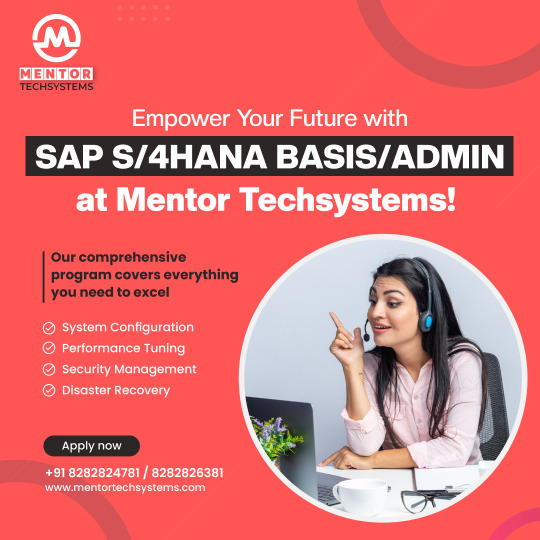
🚀 Empower Your Future with SAP S/4HANA BASIS/ADMIN at Mentor Techsystems! 💻
Dive into our comprehensive program covering System Configuration, Performance Tuning, Security Management, and Disaster Recovery.
Apply now!
��� +91 8282824781/8282826381 🌐 www.mentortechsystems.com
#mentortechsystems#CareerGoals#SAPExpert#TechTraining#SAP#S4HANA#S4HANABasis#S4HANAadmin#SAPBasis#SAPSystems#ERPsystems#EnterpriseResourcePlanning#SAPsupport#ABAP#CloudERP#OnPremiseERP#DigitalTransformation#TechConsulting#TechServices#ITOperations#ITInfrastructure#LinuxAdmin#WindowsAdmin#DatabaseAdmin#SystemsManagement#TechCertifications
0 notes
Text

#CertificationPrograms#SpecializedTraining#ITCertificationCourses#BusinessSkills#SkillUpBangalore#TechCertifications#ManagementCourses#DigitalSkillsTraining
1 note
·
View note
Text
What is the best way for someone with no programming experience to become a good e-commerce architect?
Becoming an e-commerce architect requires a combination of technical proficiency, business acumen, and practical experience. If you're starting from scratch with no programming experience, the journey will be long but rewarding. Here’s a step-by-step guide to help you transition into the role of an e-commerce architect:
Foundational Knowledge:
Programming: Start with basics. Learn a programming language like Python, JavaScript, or Ruby. Websites like Codecademy, LeetCode, and FreeCodeCamp can be very helpful.
Web Development: Learn to develop websites. Begin with HTML, CSS, and then JavaScript. This will give you a solid foundation for understanding e-commerce platforms.
Understand E-commerce Basics:
Platforms: Get to know popular e-commerce platforms like Shopify, Magento, WooCommerce, and BigCommerce.
Business Aspects: Learn about order management, payment gateways, customer relationship management (CRM), and supply chain management.
User Experience: Understand the principles of UX design. This will help you design e-commerce solutions that offer great user experiences.
Database Knowledge:
Study the basics of relational databases (e.g., MySQL, PostgreSQL).
Learn about NoSQL databases (e.g., MongoDB, Cassandra) which are increasingly used in e-commerce.
Infrastructure & Scalability:
Cloud Platforms: Get familiar with cloud providers like AWS, Google Cloud, and Azure. Many e-commerce platforms are hosted on these services.
Content Delivery Networks (CDNs): Understand how CDNs (like Cloudflare and Akamai) can speed up e-commerce websites.
Caching: Learn about caching mechanisms (like Redis) that can help enhance the performance of e-commerce sites.
Advanced Programming & Frameworks:
Delve deeper into back-end development using frameworks like Express (for Node.js) or Django (for Python).
Learn about front-end frameworks/libraries like React, Vue, or Angular.
Security:
Understand the basics of web security, especially as it pertains to e-commerce (e.g., PCI DSS compliance for payment processing).
Learn about SSL certificates, secure coding practices, and common vulnerabilities like SQL injection or cross-site scripting (XSS).
Integration & Microservices:
Understand how different systems in e-commerce (like CRMs, ERPs, payment gateways) integrate with one another.
Learn about the microservices architecture, which is often used in e-commerce to build scalable and flexible systems.
Stay Updated:
The world of e-commerce is dynamic. Keep yourself updated with the latest trends, technologies, and best practices.
Engage in online communities, forums, and attend relevant conferences.
Get Hands-On Experience:
Work on personal e-commerce projects or contribute to open-source projects.
Try to get internships or entry-level positions in e-commerce companies.
Collaborate with experienced architects and learn from their experiences.
Soft Skills:
As an architect, you'll often interface with business stakeholders, project managers, and other teams. Develop good communication, leadership, and problem-solving skills.
Certifications & Education:
Consider pursuing certifications in cloud platforms, databases, and e-commerce platforms.
While not strictly necessary, having a relevant degree (like computer science) can be beneficial.
Mentorship: If possible, find a mentor in the e-commerce field who can guide you, share their experiences, and provide insights.
Remember, becoming an e-commerce architect is not an overnight process. It requires dedication, consistent learning, and practical experience. As you continue to grow in your career, always focus on both the technological and business sides of e-commerce, as a good e-commerce architect must be proficient in both.
#EcommerceJourney#WebDevelopmentBasics#EcommercePlatforms#DatabaseLearning#CloudComputing#WebSecurity#IntegrationMicroservices#StayUpdatedInTech#EcommerceExperience#TechSoftSkills#TechCertifications#MentorshipMatters#vinhjacker#mageplaza
0 notes
Text
Invest in Your Future: Enroll in Ievision’s SQT Diploma Program

Unlock Your Future with the Software Quality Testing Diploma at Ievision
In today’s digital age, software quality assurance (QA) is critical to successful technology projects. As businesses increasingly rely on software solutions, the need for skilled professionals to ensure these products meet the highest standards has never been greater. The Software Quality Testing (SQT) Diploma at Ievision is your gateway to a fulfilling career in this dynamic field.
Why Choose the Software Quality Testing Diploma?
1. Comprehensive Curriculum
Our SQT Diploma covers all essential aspects of software testing, from test planning fundamentals to advanced test automation techniques. You will gain a solid understanding of the testing lifecycle, including various testing types, methodologies, and critical tools used in today’s software development environment.
2. Hands-On Experience
Theory is important, but practice is crucial. At Ievision, we emphasize hands-on training through real-world projects that simulate actual industry scenarios. Under the guidance of experienced instructors, you will apply your knowledge to develop practical skills, preparing you for the challenges you will face in the workplace.
3. Industry-Recognized Certification
Upon completing the program, you will earn a recognized diploma across the industry. This certification not only validates your skills but also enhances your resume, making you a competitive candidate in the job market.
4. Proficiency with Cutting-Edge Tools
In the fast-evolving tech landscape, familiarity with the latest testing tools is essential. Our program includes training on popular tools such as Selenium, JIRA, and TestRail, ensuring you are well-versed in industry standards and practices.
5. Flexible Learning Options
We understand that life can be busy. That’s why we offer flexible learning options, including online and in-person classes. You can choose a schedule that fits your needs, allowing you to balance your education with work or personal commitments.
Who Should Enroll?
This diploma is ideal for:
Aspiring software testers
Quality assurance professionals looking to upskill
IT graduates seeking a career in software testing
Career Prospects
Graduates of the Software Quality Testing Diploma can look forward to a range of exciting career opportunities, including:
Software Tester
QA Analyst
Automation Engineer
Test Manager
These roles are in high demand across various sectors, including IT, finance, healthcare, and more.
Start Your Journey Today!
Invest in your future by enrolling in the Software Quality Testing Diploma at Ievision. Equip yourself with the skills and knowledge necessary to thrive in a rewarding career in software quality assurance. Enroll now and take the first step towards transforming your passion for technology into a successful profession!
Conclusion
Embarking on a journey in software quality assurance is both a strategic and rewarding decision in today’s technology-driven world. The Software Quality Testing Diploma at Ievision offers you the opportunity to gain comprehensive knowledge and hands-on experience in a critical field that is essential to the success of any software development project.
With a curriculum designed to equip you with the latest skills, industry-recognized certification, and access to cutting-edge tools, you’ll be well-prepared to meet the demands of employers. Whether you are an aspiring tester, a quality assurance professional looking to upskill, or an IT graduate seeking a new path, this diploma is the ideal stepping stone to a thriving career.
#SoftwareQuality#QualityAssurance#SQTDiploma#SoftwareTesting#CareerGrowth#TechEducation#LearnToTest#AutomationTesting#ITCareers#HandsOnTraining#EnrollNow#FutureOfTech#TestingTools#SkillsDevelopment#TechCertification
0 notes
Text
Accelerate your tech career with a Full Stack Developer certification. Discover how this versatile qualification can enhance your skills, increase your earning potential, and open doors to global job opportunities.
#FullStackDeveloper#TechCertification#CareerInTech#WebDevelopment#Coding#TechCareer#SoftwareDevelopment#Programming#DeveloperLife#LearnToCode
0 notes
Text

Get ready for the Azure Network Engineer Associate (AZ-700) exam with our specialized courses. Master the skills needed to design, implement, and manage Azure networking solutions. https://www.dclessons.com/category/courses/azure-network-engineer-associate-az-700
0 notes
Text
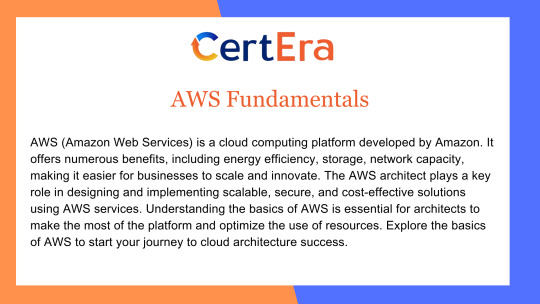
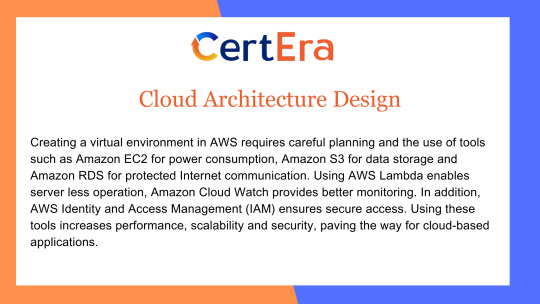
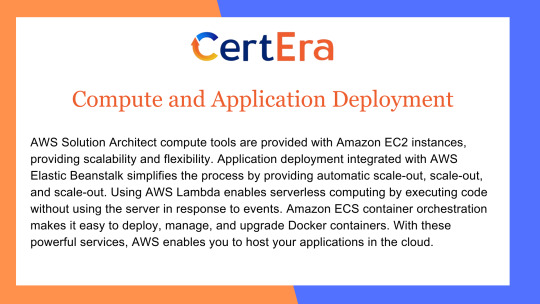
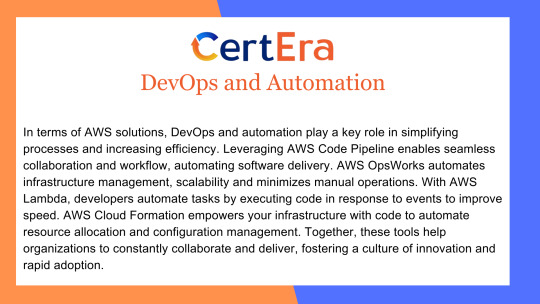
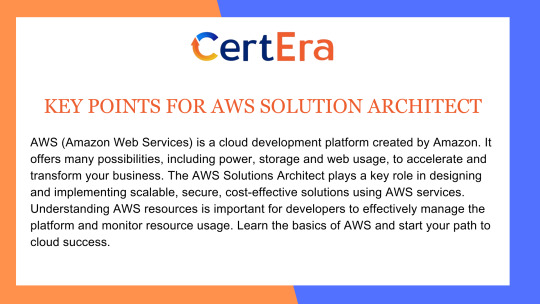
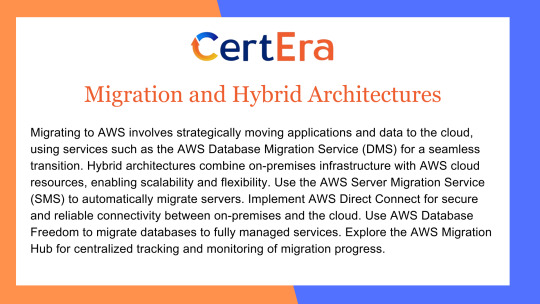
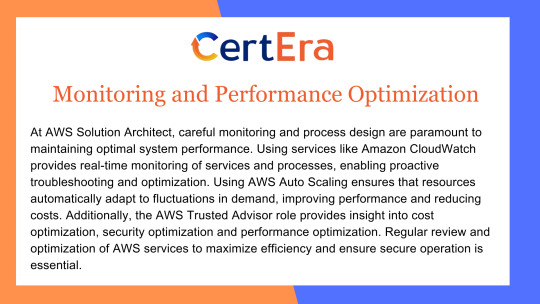
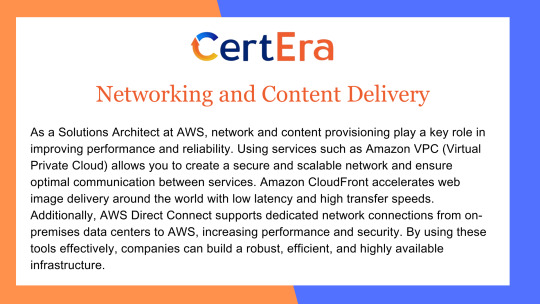

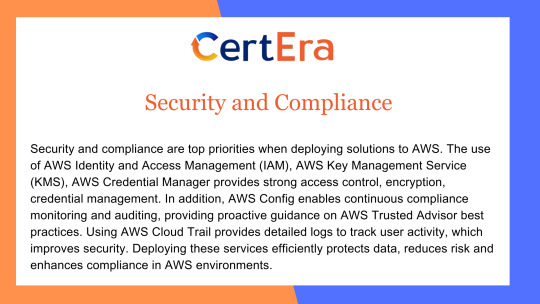


"🚀 Use these study suggestions to ace the AWS Solution Architect exam: practice labs, FAQs, forums, and staying current! "#TechPrep #AWSCertification"
#AWSSolutionArchitect#AWS#CloudComputing#CertificationPrep#StudyTips#AWSExam#TechSkills#CareerDevelopment#AWSCertification#ITTraining#CloudArchitecture#ExamPrep#StudySmart#CareerGrowth#TechCertification#AWSLearning#ITCareer#CloudSkills#AWSKnowledge#ProfessionalDevelopment
0 notes
Text
AI in Customer Service: How It’s Changing the Way Businesses Help You

Have you ever contacted a company and wondered, “Am I chatting with a real person or a robot?” If you’ve asked yourself this, you’re not alone! Artificial Intelligence (AI) is becoming a bigger part of customer service, and it’s making a huge difference in how businesses respond to you. From chatbots and virtual assistants to tools that predict what you need, AI is transforming the way companies engage with customers like never before.
The Growing Role of AI in Customer Service
AI has come a long way in customer service, and it’s not just about robots answering your questions anymore. These days, AI tools can manage entire conversations, predict what you might need help with, and even solve problems before you realize you have them! Think about how Amazon helps you track orders, or how Sephora helps you pick the perfect makeup shade online all with AI.
What’s exciting is that AI makes things faster and more efficient for everyone. So, the next time you get quick help online, there’s a good chance AI is behind it, working to make things easier for you. In the next section, we’ll look at how AI is being used by businesses to make customer service better.
Real-World Examples of AI in Action
Automated Ticketing: Have you ever had a problem and received an instant response, saying your issue is being handled? That’s likely AI in action. Companies like Zendesk use AI to categorize and route customer problems, making sure they reach the right person quickly.
Sentiment Analysis: Some companies use AI to understand how customers feel based on what they say online. Coca-Cola, for example, keeps track of what people are saying about them on social media using AI, so they know when something needs attention or when people love their product.
Personalized Recommendations: If you use Netflix or Spotify, you’ve probably noticed that they seem to know exactly what you’ll enjoy watching or listening to. That’s AI analyzing your habits and suggesting content tailored to your tastes!
Fraud Detection: AI isn’t just about answering questions it can also protect you. PayPal uses AI to detect any unusual activity in your account, helping to prevent fraud before it becomes a big issue.
AI is already doing a lot to make customer service faster, smarter, and more personal. As more businesses adopt these tools, your experience as a customer will keep getting better. Next, let’s dive into the benefits AI brings to customer service.

● Saving Time and Money: One of the biggest reasons companies love AI is that it saves both time and money. For example, chatbots can handle lots of questions at once, meaning businesses don’t need as many people working the phones. Juniper Research even predicts that by 2023, AI-powered chatbots will save businesses over $11 billion every year!
● Always Available: AI doesn’t need breaks or sleep. Companies like H&M use chatbots that are available 24/7, so you can get help no matter when you need it whether it’s day or night.
● Consistent Answers: Ever had two customer service agents give you different answers? AI avoids this by always giving the same, accurate information. AT&T uses AI to make sure every customer gets consistent, reliable service.
● Scaling Up: As companies grow, AI helps them handle more customers without losing quality. Bank of America’s virtual assistant, Erica, talks to thousands of customers a day, providing helpful, fast answers to everyone.
● Predicting Problems: Some companies, like Tesla, use AI to predict when something might go wrong before you even notice. That way, they can alert you and fix the problem early, which makes your life easier.
The benefits of AI are hard to ignore. Whether it’s cutting down wait times, being available around the clock, or ensuring you always get the right information, AI is making customer service better in ways that matter to you. But even with all these perks, AI does have some challenges. Let’s look at those next.
The Challenges of AI in Customer Service
Even though AI is amazing, it’s not perfect. Here are a few things that still need work:
● No Personal Touch: Sometimes, you just need to talk to a real person. While AI can handle simple questions, it might not do well when it comes to complex or emotional issues. For instance, Nordstrom uses AI for quick fixes but makes sure a human is there to help with trickier problems.
● It’s Expensive at First: Setting up AI tools can cost a lot of money. IBM Watson, for example, offers super-smart AI services, but smaller businesses might struggle to afford it initially.
● Privacy Concerns: AI often needs access to personal data to work well, which raises privacy concerns. In 2021, Facebook had a big data breach, reminding companies and customers alike how important it is to protect user data.
● Too Much Automation: Over-relying on AI can make customers feel disconnected. Zappos, for example, keeps a balance by using AI for some tasks while still having humans handle more personalized interactions.
AI can’t do everything at least, not yet. It’s great for handling basic tasks, but human interaction is still essential, especially when it comes to more complicated situations. Let’s now explore how you can boost your skills with AI certifications for customer service.
Want to Get Ahead? Check Out These AI Certifications
If you’re interested in learning how AI is changing customer service and how you can be part of that change there are some great certifications available. Here are a few worth checking out:
● AI+ Customer Service Certification from AI CERTs: This course is all about using AI to improve customer service, covering everything from chatbots to analytics.
● AI for Business Professionals on Coursera: Perfect for people who want to understand how AI can enhance business operations, including customer service.
● AI Fundamentals by Microsoft: A beginner-friendly certification that covers AI basics and how it can be applied to automate customer service.
● AI & Machine Learning in Customer Experience by Udacity: This course focuses on using AI to create better customer experiences.

These certifications can give you a leg up in understanding AI and how it’s shaping the future of customer service. It’s a great way to stay competitive in a world where technology is constantly changing. Finally, let’s wrap things up with a quick conclusion.
Wrapping It All Up
AI is changing the way businesses interact with their customers, making service faster, more efficient, and more personalized. Whether it’s answering questions, predicting your needs, or helping prevent problems, AI is playing a big role in making sure customers get the support they need. However, it’s important to strike a balance AI is great, but sometimes, you still need that human touch.
In short, AI is revolutionizing customer service, but the best experiences come when companies mix technology with empathy. The future is exciting, and AI is here to make it even better! And that’s a wrap on how AI is shaping the future of customer service!
FAQ: Common Questions About AI in Customer Service
As AI continues to revolutionize customer service, many people have questions about how it works and what it means for their interactions with businesses. Below are some frequently asked questions (and answers!) to help clear up any confusion:
Q1: Will AI replace human customer service agents? While AI is incredibly useful for handling routine inquiries and providing quick responses, it’s unlikely to completely replace human agents. Many companies use a combination of AI and human support to balance efficiency with personalized service. For complex or emotionally charged issues, people still prefer talking to a real person.
Q2: How do chatbots work in customer service? Chatbots use AI to understand and respond to customer queries. They’re programmed to recognize certain keywords and phrases, allowing them to provide relevant answers or guide users to the information they need. Many chatbots are also equipped with machine learning, which helps them improve over time based on past interactions.
Q3: Are my conversations with AI tools private? Privacy is a major concern when it comes to AI, especially since these tools often rely on customer data. Reputable companies prioritize data security and follow regulations to protect your information. However, it’s always wise to check a company’s privacy policy to understand how your data is being used.
Q4: Can AI understand emotions or respond empathetically? AI is getting better at analyzing customer sentiment through natural language processing (NLP), which helps it recognize emotions based on the words you use. However, it’s not quite the same as human empathy. Some businesses use AI for initial contact but transfer you to a human agent for more sensitive issues.
Q5: Is AI used in customer service only for big companies? Not at all! While big companies like Amazon and Google are known for using AI, many small and medium-sized businesses are adopting AI-powered tools to improve their customer service. Solutions like chatbots and automated ticketing systems are becoming more affordable and accessible to businesses of all sizes.
“Have questions or are ready to take the next step in your AI certification journey? Reach out to us at AI CERTs — our team is here to guide you every step of the way!”
#careeradvancement#careergrowth#certificationguide#explore#reblogs#inspiration#top10certifications#techcertifications#professionaldevelopment#creativity
0 notes
Text

Elevate your career with H2K Infosys' Selenium Certification Online. Master automated testing and boost your skills with our industry-focused program. Led by experienced professionals, our comprehensive online course ensures expertise in the best selenium certification. Designed for flexibility, our certification program allows you to learn at your own pace without compromising quality. H2K Infosys guarantees a seamless online learning experience, providing hands-on training for real-world applications. Secure your future in software testing and advance your career with a recognized Selenium certification. Join H2K Infosys now and unlock new opportunities in the dynamic field of IT. Enroll for Selenium Certification Online today!
#SeleniumTraining#TechCertification#WebTestingSkills#CertifiedSelenium#WebTestingMastery#LearnSelenium
0 notes
Text
What is a "Wireless POS Terminal"?
The Wireless POS Terminal, functioning as a Bluetooth device, enables the processing of credit cards without relying on a wired connection, instead depending on WiFi. In India, dealing with Wireless POS Terminals mandates the acquisition of an ETA Certificate to secure legal authorization and licensing.
The ETA Certificate, issued by the Wireless Planning and Coordination Wing of the Department of Telecommunications, guarantees that the product aligns with consumer requirements and adheres to the country's standards for the frequency range.
Benefits of acquiring an ETA Certificate for POS Terminal:-
Legal Authorization
Consumer Trust
Regulatory Compliance
Enhanced Security
Market Credibility
Market Access
Operational Efficiency
Quality Assurance
Competitive Advantage
Risk Mitigation
To get a large number of information about us you can check also these pages:- Make in India, NGO, NGO Darpan,
#ETACertificate#WirelessCompliance#RegulatoryApproval#LegalAuthorization#WirelessStandards#ETAApproval#CertificationProcess#ComplianceMatters#SecureWireless#TechCertification#FrequencyStandards#BusinessLegitimacy
0 notes
Text
Elevate Your Career with Premier SAP Training at Metaphor Networks, Bhubaneswar
In today's tech-driven era, SAP expertise unlocks a realm of unparalleled career prospects. Metaphor Networks proudly stands as the premier SAP Training Institute in Bhubaneswar, offering an array of comprehensive courses perfectly attuned to industry demands and career aspirations.
Pioneering SAP Coaching Excellence
Metaphor Networks is dedicated to delivering top-tier SAP training, equipping individuals with cutting-edge skills vital for the industry. Our SAP academy embraces learners at every stage, whether you're starting afresh or seeking advanced SAP expertise.
Key Offerings at Metaphor Networks:
Extensive SAP Classes: Covering modules from ERP and Business Intelligence to Supply Chain Management and beyond.
Flexible Learning: Seamlessly transition between online and in-person SAP classes without compromising on quality.
Certification Preparedness: Guiding and preparing students to excel in SAP training and certification, ensuring they shine in a competitive job market.
Your Pathway to SAP Mastery
Metaphor Networks understands the importance of a structured and effective SAP learning journey. Our experienced faculty and cutting-edge resources ensure that each individual embarks on a successful SAP learning experience.
What Distinguishes Us:
Industry-Relevant Curriculum: Our SAP training center maintains a curriculum consistently updated to meet industry standards, ensuring its relevance and applicability.
Holistic Approach: Blending theory with practical experiences and hands-on SAP software training for real-world applications.
Career Guidance: Assisting individuals in navigating their careers post-training, ensuring a smooth entry into the expansive SAP landscape.
Empowering Your SAP Odyssey
Metaphor Networks stands as a guiding light for those delving into SAP training in India. Our institute simplifies the learning process, making SAP education accessible to all passionate learners.
Discover SAP at Metaphor Networks:
Comprehensive Learning Resources: Covering basic fundamentals to specialized modules, catering to diverse learning needs.
Online Learning Convenience: Engage in interactive and comprehensive SAP courses online, ensuring flexibility and accessibility.
Placement Support: Beyond training, we offer placement assistance to seamlessly transition into a rewarding SAP career.
Begin Your SAP Journey with Metaphor Networks
As a premier SAP Training Institute, our mission is to empower individuals with the skills necessary to excel in the SAP domain. Join Metaphor Networks and unlock a world of possibilities with tailor-made SAP certification courses!
Ready to embark on your SAP journey? Contact us at [Phone: 9348265522] or visit www.metaphornetworks.com to explore our courses and take the first step towards a thriving career in SAP.
#SAPTraining#SAPCertification#SAPCourses#LearnSAP#SAPCareer#SAPEducation#TechTraining#CareerDevelopment#ITTraining#SAPSkills#FutureInSAP#SAPLearning#TechCertification#ProfessionalGrowth#SAPInstitute#BhubaneswarTraining#TechnologyEducation#SAPExperts#SAPCommunity#MetaphorNetworks
1 note
·
View note
Text
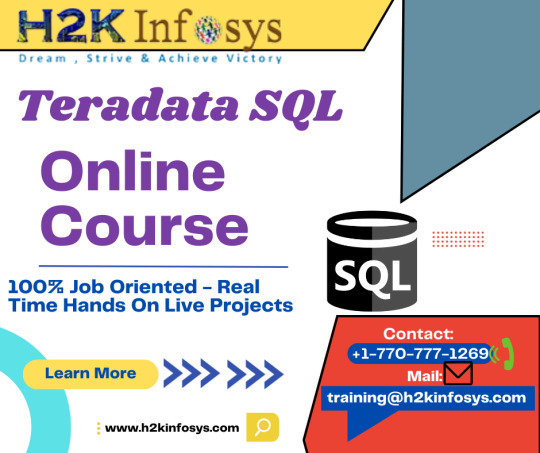
Teradata SQL Online Certification Training | H2k Infosys
Introduction:
Teradata SQL refers to the structured query language (SQL) dialect used specifically with Teradata Database, a popular data warehousing solution. SQL is a domain-specific language used for managing and querying relational databases. Teradata SQL is tailored to work efficiently with the Teradata Database, which is known for its parallel processing capabilities and its ability to handle large-scale data processing.
Key aspects of Teradata SQL:
Parallel Processing: Teradata is designed for parallel processing, meaning it can divide tasks among multiple processors to handle large volumes of data more efficiently.

Why Choose H2k Infosys for this Teradata SQL Training
H2k Infosys provides 100% job oriented Teradata training online and onsite training to individuals and corporate teams.
Our Teradata certification training is instructor-led, face-to-face training with live classes.
We incorporate real-time project work in our Teradata training which helps our students gain practical, hands-on experience.
Our faculty are accomplished data professionals in their rights with many years of industrial and teaching experience.
During our Teradata SQL training H2k infosys, we conduct several mock interviews to help you gain the confidence to face real interviews.
After completion of the course, we assist you in preparing your resume.
We also provide you with recruiter driven job placement assistance Future of Teradata SQL:
Integration with Cloud Services: Teradata is working on enhancing its cloud offerings. This includes the integration with popular cloud platforms like AWS, Azure, and Google Cloud. The future may see more seamless integration and optimization for cloud-based deployments.
Advanced Analytics and Machine Learning: Teradata has been expanding its capabilities in advanced analytics and machine learning. Expect more features and functionalities geared towards data science applications.
Focus on Hybrid and Multi-Cloud Environments: As organizations increasingly adopt hybrid and multi-cloud strategies, Teradata may continue to evolve to support these complex environments.
Optimization for IoT and Streaming Data: With the proliferation of IoT devices and the importance of real-time data processing, Teradata may develop features to handle streaming data and IoT workloads more efficiently.
AI-Driven Automation and Optimization: Automation and AI-driven features may become more prominent in Teradata SQL to help optimize queries, workload management, and performance tuning.
Tags: H2kinfosys, Teradata SQL Online Certification Training | H2k Infosys, Teradata Database, For Basic Level, Teradata SQL Aggregates, data warehousing, data engineering, real-time project work training.
#TeradataSQLTraining#TeradataCertification#SQLCertification#DataWarehousingTraining#DatabaseCertification#OnlineLearning#ITTraining#SQLQueries#DatabaseSkills#DataAnalyticsTraining#TeradataDatabase#TechCertification#SQLSkills#DataManagement#OnlineCourse#TeradataAnalytics#DatabaseDevelopment#SQLCourse#DataWarehousingSkills
0 notes
Text
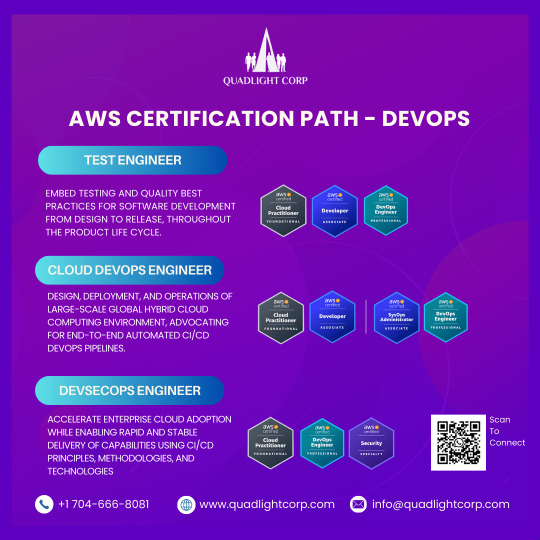
AWS Certification Path -Devops Test Engineer: Embed testing and quality best practices for software development from design to release, throughout the product life cycle. Cloud DevOps Engineer: Design, deployment, and operations of large-scale global hybrid cloud computing environment, advocating for end-to-end automated CI/CD DevOps pipelines. DevSecOps engineer: Accelerate enterprise cloud adoption while enabling rapid and stable delivery of capabilities using CI/CD principles, methodologies, and technologies
📱 Mobile: +1(704)-666-8081 📧 Email: [email protected] 🌐 Website: https://quadlightcorp.com/
AWSCertification #TestEngineer #CloudDevOps #DevSecOps #SoftwareDevelopment #QualityAssurance #CloudComputing #CICD #DevOpsPipelines #EnterpriseCloud #Automation #TechCertification #AWS #CloudInfrastructure #DevOpsEngineering #CloudAdoption #TechSkills #ProfessionalDevelopment #CloudEngineering #SecurityInDevOps
0 notes
Text
Study for your tech certification with these guides from Pearson
Study for your tech certification with these guides from Pearson #sale #techcertification #ccna #comptia #cisco #aws #cissp #certification #study #education #learning #pearson
Use this link to check out the book bundle options. Preparing for a tech certification exam to advance your career? Get ready—and don’t sweat it—with the help of these practical study resources from Pearson! The guides in this bundle cover a range of the most popular certifications, including Cisco CCNA, CompTIA Network+, CISSP, AWS Solutions Architect, and more networking, security, and IT…

View On WordPress
#book#books#ccna#ceh#certification#cisco#comptia#ebook#ebooks#humble bundle#network#networking#security#tech certification
0 notes